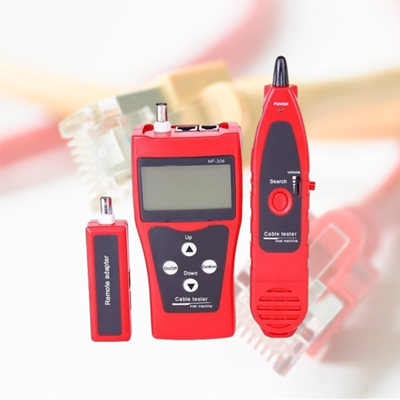What is a Network Cable Tester?
A network cable tester is a tool used to verify the integrity and connectivity of network cables, such as Ethernet cables (e.g., Cat5e, Cat6). It's commonly used by network administrators, IT professionals, and technicians during network installations, maintenance, and troubleshooting processes.
The primary function of a network cable tester is to determine whether a cable is properly wired and functioning correctly. It can detect common issues such as open circuits, short circuits, crossed wires, and incorrect pinouts. By connecting the tester to both ends of the cable being tested, it sends signals through the cable and analyzes the responses to identify any faults or misconfigurations.
Understanding Network Cable Testers

A network cable tester is a device used to examine the electrical connections within a network cable. It evaluates various parameters such as continuity, wiring configuration, and signal strength to determine the cable's suitability for transmitting data reliably.
- Fault Identification: Network cable testers help pinpoint faults like breaks, short circuits, or incorrect wiring in cables.
- Quality Assurance: They verify compliance with industry standards and ensure optimal performance.
- Troubleshooting: By identifying issues promptly, network administrators can troubleshoot and rectify problems efficiently, minimizing downtime.
Types of Network Cable Testers
- Basic Cable Testers: These testers detect basic faults like continuity and shorts. They are suitable for simple cable testing tasks and are often handheld.
- Advanced Cable Certifiers: Certifiers provide comprehensive testing capabilities, including certification according to specific standards like TIA/EIA. They offer detailed reports on cable performance and can certify installations for warranty purposes.
- Tone Generators and Probes: Used for tracing cables in complex network setups, tone generators emit a tone that can be detected by a probe, helping identify cables within a bundle or wall.
- Ethernet Cable Testers: Specifically designed for Ethernet cables, these testers assess parameters like signal strength, crosstalk, and cable length.
How do Network Cable Testers Work?
- Physical Connection: The cable tester consists of two main components: a transmitter and a receiver. Both components are connected to each end of the cable being tested.
- Signal Generation: The transmitter generates electrical signals that are sent through the cable being tested. These signals can vary depending on the type of test being performed. For example, in a basic continuity test, the transmitter sends a signal through each wire in the cable.
- Signal Reception: The receiver, connected to the other end of the cable, receives the signals transmitted by the transmitter.
- Analysis: The receiver analyzes the received signals to check for various faults. It compares the received signals against expected patterns or standards. For example, in a continuity test, the receiver checks if the signals received from each wire match the signals sent by the transmitter. Any discrepancies indicate a fault in the cable.
- Display: Many cable testers have built-in displays or indicator lights to provide feedback to the user. They indicate the status of each wire in the cable, highlighting any faults detected. Some advanced testers may also provide detailed information about the nature of the fault, such as whether it's an open circuit, short circuit, or crossed wire.
- Remote Testing: Some cable testers come with remote units that allow testing cables over longer distances. The remote unit is connected to one end of the cable, while the main unit (transmitter and receiver) is connected to the other end. This feature is particularly useful for testing installed cables in walls or ceilings.
Importance in Network Infrastructure
- Reliability: Ensures cables meet performance criteria, reducing the likelihood of network downtime due to faulty cabling.
- Efficiency: Facilitates rapid identification and resolution of cable-related issues, minimizing troubleshooting time and effort.
- Compliance: Certifies installations to industry standards, assuring quality and adherence to regulations.
- Cost Savings: Prevents costly downtime by proactively identifying and rectifying cable faults before they cause network outages.
In the intricate web of network infrastructure, where the reliability of data transmission is paramount, network cable testers emerge as indispensable tools. From basic continuity checks to comprehensive certification, these testers play a vital role in ensuring the integrity and performance of network cables. By leveraging their capabilities, network administrators can uphold the robustness of their networks, fostering seamless communication and efficiency in the digital realm.
Ready to ensure your network runs smoothly and efficiently? Don't let connectivity issues slow you down. Invest in a reliable network cable tester today and say goodbye to troubleshooting headaches. Choose high-quality network testers, starting from the ATO one-stop online store.

